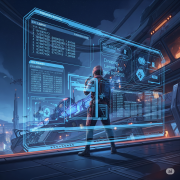Memory editing tools provide interesting insights into how contemporary software uses system memory, which can be useful for both technical game hacks exploration and engine debugging. Programmers and engineers may experience a hands-on approach of learning through the use of these tools. As a result, aspects that can be learned include the performance of memory patterns, pointers, and real-time data manipulation.
Memory Editing Tools: What are They?
Software like ArtMoney, Cheat Engine, and GameConqueror are examples of memory editors. They work by searching and reversing the storage of an active program. In terms of gaming, these tools allow players to navigate and alter the files inside the memory such as player’s health and ammunition.
Remember that memory editors aren’t just for hackers; they have valid applications in testing, mod making, and educational reverse engineering as well.
Memory Editing: A Beginner’s Guide
 Runtime variables (such player health or experience points) are saved in random access memory (RAM). Rather of being hardcoded, these variables are dynamic and stored at addresses that can change based on the current system state and the design of the game.
Runtime variables (such player health or experience points) are saved in random access memory (RAM). Rather of being hardcoded, these variables are dynamic and stored at addresses that can change based on the current system state and the design of the game.
Memory editors look for certain numbers in the game’s memory to do their jobs. This is how things usually work:
To start, type in the present value, like “health” = 100. Then, the tool will look for all memory addresses that match.
Refine Findings
Make the necessary in-game adjustments (like taking damage) and then rescan for the updated value (like health = 85).
Keep or Change
Finding the right address is the first step in freezing, increasing, or changing the value.
Scanners for Pointers and Pointers with Multiple Levels
In order to track the static base address, sophisticated systems employ pointer scanning, since memory addresses frequently change upon game restarts. Locating pointers that point to addresses in other parts of memory, sometimes on different levels (multi-level pointers), is part of this process.
If you want to write reliable trainers or automated scripts, you must master pointers. Dereferencing and base offset computations are fundamental here, as any developer familiar with C or C++ can tell you.
READ ALSO: 7 Powerful MelonLoader Features Every Unity Developer Should Know
Concerns, Morality, and Anti-Cheat Measures
Various anti-cheat systems, such as VAC, EAC, or BattleEye, are included into the majority of current video games. In order to identify instances of illegal memory access, these systems look for certain patterns, unusual behaviors, or signature matches.
Studying memory editing tools gives developers significant information into flaws and potential exploits, which is useful for ethical hacking and making secure games.
End Notes
Game hacks and memory editing tools are usually connected with each other. Both of them are useful in learning data patterns, real time program performance, storage management, and more. Coders, game developers, and even hackers may know about software systems through memory scanning. Through this, they may have hands-on experience.
